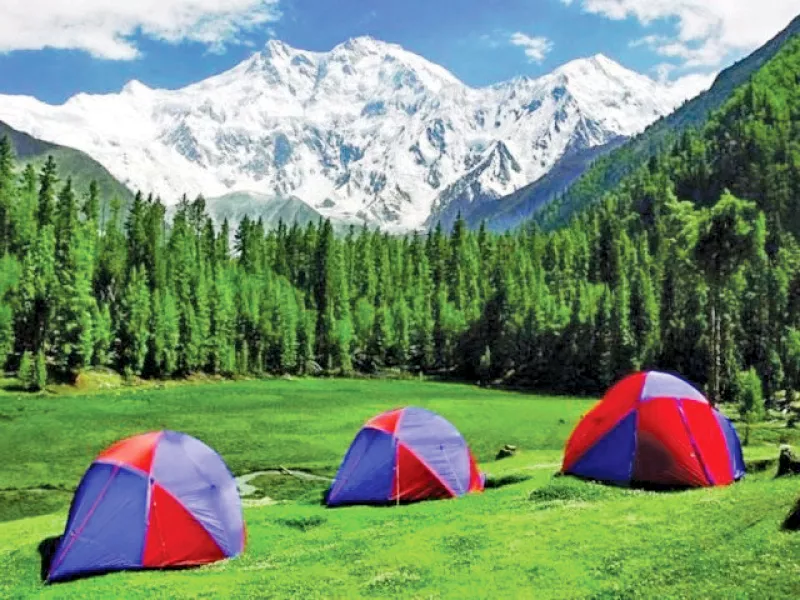NCOC issues guidelines for tourism sector
Tourism sites to be opened from Monday under strict coronavirus SOPs.
ISLAMABAD:The National Command and Operation Centre (NCOC) on Saturday issued a set of guidelines for the visitors and planners of the tours to the tourist spots, which will be opened from Monday under strict coronavirus standard operating procedures (SOPs).
On May 19, the NCOC, which supervises the government’s unified strategy to stem the spread of the global pandemic, dropped several restrictions it had imposed during the Eidul Fitr holidays earlier this month.
Besides, opening the tourism, the NCOC also allowed a staggered re-opening of education sector – all public and private education institutions – from Monday in districts where coronavirus positivity ratio is less than 5%.
However, considering the prevailing disease situation across various districts, education sector in districts with high positivity ratio will remain closed till June 6, the NCOC said in a statement on Saturday. The forum will take another review of the situation on June 3.
The NCOC guidelines for the tourism sector stipulate that only healthy people will be allowed to visit. For that purpose, the hotel and guesthouse managements must demand a negative coronavirus test report and a national identity card from the guests.
Read Pakistan asks US help arrange Covid vaccine
After June 1, hotel staff will not book rooms for any person over the age of 50 years without a vaccination certificate, and after July 1, the presentation of vaccination certificate would be mandatory for every visitor over the age of 40 years.
The visitors would fill a health declaration form at the entrance of the tourist spots. The visitors would be required to carry sufficient quantity of face masks and sanitisers. All travellers must wear masks at every tourist destination, the guidelines said.
Similarly, travellers from abroad will have to follow tests, quarantine and vaccination policy, according to the new guidelines. Camping will be allowed at reasonable distance and under strict SOPs, the NCOC statement said.
Vaccination of tour operators, tour guides, hotels, guest house management and staff would be ensured under the National Vaccination Policy. The tour operators and hotel management will be required to provide data of all passenger to the district administration.
Education sector Educational institutions in districts with less than 5% Covid positivity ratio are set to resume classes from Monday but these institutions in 52 districts of the country have been closed till June 6 because of more than 5% positivity ratio.
These districts include Badin, Dadu, Hyderabad, Jamshoro, Sukkur, Shaheed Benazirabad, and all districts of Karachi in Sindh; Muzafarabad, Ponch, Bagh and Sadhnoti districts of Azad Jammu and Kashmir (AJK), Quetta district of Balochistan and the Islamabad Capital Territory (ICT).
However, the Sindh government decided on Saturday to retain the current restrictions in the province for another two weeks, amid surge in the Covid-19 cases. The decision was taken during a meeting of the coronavirus taskforce chaired by Chief Minister Murad Ali Shah.
In Punjab, the districts with more than 5% positivity are Attock, Bahawalpur, Bhakkar, Dera Ghazi Khan, Faisalabad, Gujranwala, Gujrat, Khanewal, Khushab, Lahore, Layyah, Lodhran, Mianwali, Multan, Muzaffargarh, Okara, Rahim Yar Khan, Rawalpindi, Sargodha, and Toba Tek Singh.
Similarly, the high positivity districts of Khyber Pakhtunkhwa are Abbottabad, Bannu, Buner, Charsadda, Lower Dir, Upper Dir, Haripur, Kohat, Karam, Mardan, Nowshera, Peshawar, Swabi, and Swat, where educational institutions would remain closed for two more weeks.
Vaccination drive expanded The NCOC guidelines have been issued as the vaccination drive entered a new phase as the authorities concerned started administering jabs to the people over the age of 30 years.
In a tweet, the NCOC has urged the people above 30 years to register themselves for the vaccine shots. With the expansion of the vaccination drive, the government is also working on the availability of the doses.
According to the National Institute of Health (NIH) the locally-packaged vaccine would be available for use from the next week. “Testing of the single-dose vaccine CanSino vaccine has been completed in accordance with international standards,” the NIH said.
“By next week, the NIH will have prepared more than 100,000 doses of the vaccine.” According to officials, the raw material for 120,000 doses of CanSino vaccine arrived in Pakistan from China between on May 5.
Read more Govt delays Covid spending report
They added that around 100,000 more doses were expected to reach Pakistan by next month. The government has purchased millions of doses from China. According to the health ministry officials, a letter had been written to the Accountant General of Pakistan make the direct payment to vaccine producers.
The authorities would pay $60.6 million to SinoVac for providing 1 million doses, while $52.5 to CanSino for providing nearly 300,000 doses. The payment would be made from $150 million allocated for the purchase of the vaccine, according to sources.
Meanwhile, the national tally of active Covid-19 cases increased to 63,436, including 4,819 admitted to various hospitals, as 4,007 more people tested positive for the virus, while 3,712 people recovered from the disease during the last 24 hours.
The NCOC said in its daily update of the disease that 88 patients, of them 80 in hospitals, including 40 on ventilators, died during the past 24 hours. It added that most of the deaths, 35, occurred in Punjab followed by 23 in Khyber Pakhtunkhwa and 20 in Sindh.
Since the outbreak of the pandemic in February 2020, the nation caseload of the disease has risen to 897,468, while 813,855 of them have made full recovery from the disease so far. According to the NCOC, the nationwide death toll stood at 20,177 on Saturday. (WITH INPUT FROM APP)


COMMENTS
Comments are moderated and generally will be posted if they are on-topic and not abusive.
For more information, please see our Comments FAQ